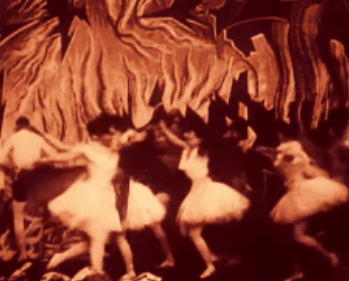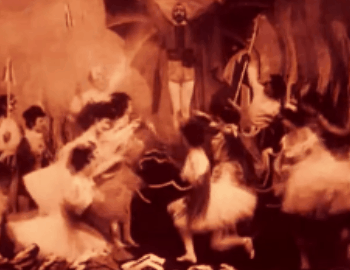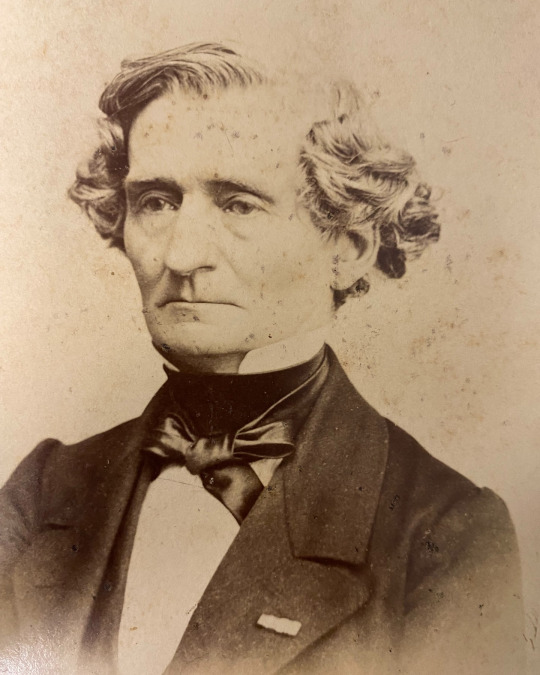#the damnation of faust
Explore tagged Tumblr posts
Text



Faust aux enfers (1903)
#faust aux enfers#the damnation of faust#georges méliès#1900s movies#1903#fantasy#short film#devil#mephistopheles#hell#horrorgifs#gif#my gifs
220 notes
·
View notes
Text

91 notes
·
View notes
Text
i’m sorry WHY is this so funny
#opera tag#opera#la damnation de faust#the damnation of faust#michael spyres#tenors…#berlioz#hector berlioz#IT’S SO FUNNY THOUGH
29 notes
·
View notes
Text

I keep meaning to do another set of these only with academic tweets, but I think the academic tweets would be funnier with pics of the Marlowe version and I am too lazy to make screencaps (the vast majority of images out there are gifs and idk how to paste things on gifs).
Anyway, here's one that definitely works better in the Goetheverse.
#the goetheverse encompasses the operatic versions that are based on him which is nearly all of them#hot faust summer#la damnation de faust#look i get WHY mad scientist stories use faust as a template#there's a lot to say about that especially in the marlowe version#I taught a course on science fiction in grad school and had doctor faustus as the first thing on the syllabus#(my students did not appreciate this at all)#i still stand by faust being fundamentally a mad humanist 😉
70 notes
·
View notes
Text

Georges Dola “Damnation De Faust” Original Poster-Théatre-Opera (1893)
Source
46 notes
·
View notes
Text
Now I'm not saying yall would fall for the first faustian deal yall were offered.. but I am saying if the devil offered you the power to be a sick ass wizard in exchange for your soul or some shit, I think 99% of tumblr would instantly take the deal... just saying.
3 notes
·
View notes
Text

youtube
11 notes
·
View notes
Text

For @shredsandpatches, the amazing John Relyea, who has played multiple opera incarnations of Mephistopheles, dressed as Mephistopheles from Frau Faust by Kore Yamazaki!
#mephistopheles#faust#frau faust#john relyea#fyo can actually draw#la damnation de faust#since that's one of the faust operas he's been in (and was recently with a certain friend of mine ;)
7 notes
·
View notes
Text


OTD in Music History: Nineteen-year-old Hector Berlioz (1803 – 1869) makes the first of what will become many contributions to the musical press when he publishes a letter in “Le Corsaire” in 1823, defending French opera against what he sees as “incursions” from Italian opera within the Parisian musical scene. (Berlioz contended that “all of [Giacchino] Rossini’s [1792 – 1868] operas put together” cannot withstand comparison with “even a few bars” of the works of Christoph Willibald Gluck [1714 – 1787] or Gaspare Spontini [1774 – 1851]. History has not endorsed this view.)
The son of a provincial French doctor, Berlioz attended a Parisian medical college before defying his family’s wishes and becoming a musician. He briefly moderated his style to win the famous "Prix de Rome" in 1830, but, as he later attested, he “learned very little” during his years at the Paris Conservatoire and he ultimately charted “his own course.” For many years, opinion remained sharply divided between those who hailed him as an original genius, and those who argued that his music lacked both form and coherence.
Berlioz completed three operas. The first, “Benvenuto Cellini” (1838) was a flop. The second, a huge epic entitled “Les Troyens” (“The Trojans,” 1858), was never staged in its entirety during his lifetime -- today some consider it to be one of the greatest operatic masterpieces of all time, while some hardly consider it at all. The third, “Béatrice et Bénédict” (1863), was actually a success at its premiere… but it has never truly entered the standard operatic repertoire.
Later in his career, Berlioz increasingly turned to conducting (he was one of the first “modern” conductors), and, to support himself, he also wrote voluminous amounts of criticism (he is generally regarded as one of the greatest music critics in history). His “Treatise on Instrumentation” (1844) was and remains a landmark work.
PICTURED: A lovely cabinet photo of Berlioz, published in Paris in the 1890s.
#opera#classical music#music history#bel canto#composer#classical composer#aria#classical studies#Hector Berlioz#Berlioz#classical musician#classical musicians#classical history#chest voice#historian of music#maestro#musician#musicians#Romantic composer#La Damnation de Faust#Paris Conservatoire#Orchestra#symphony#Overture#Oratorio#Huit scènes de Faust#Chamber music#Nocturne
13 notes
·
View notes
Text

Alphonse Marie de Neuville (1835–1885) - “Witches and Wolves”
illustration for Berlioz’ ‘La Damnation de Faust’
watercolour on paper
#alphonse marie de neuville#alphonse de neuville#witches and wolves#la damnation de faust#faust#berlioz#19th century art#19th century#witch#witches#witchcraft#wolves#demons#occult#horror art#dark art#art#illustration#watercolour#painting
240 notes
·
View notes
Text

18 notes
·
View notes
Note
Good afternoon/evening Mr Liszt :) I was listening to Symphonie fantastique and I was wondering if Totentanz was inspired by it?
Good morning my dear pupil.
I suppose listening to the Songe d'une nuit de sabbat sparked this doubt. Although our very strong friendship certainly has had some effect on the both of us - "Hamlet" he used to call me, Hector a fervent atheist with the strongest mystical experiences I have ever encountered - I'd suppose the clearest bond between our musical choices would be his idea to include the Hungarian march in La damnation de Faust, with all that the Ràkòczi March meant for me and all Hungarians abroad.
In the Symphonie Fantastique he included the gregorian canon for the Dies irae, which outdates us all by many centuries and has always been a stable for all students of music. Such a coincidence is incidental. The Dies irae has been the basis for my "Dance of the Dead", Totentanz, as a self-explaining motive, and for some other compositions of mine such as one of the Mephisto-Walzer. The Totentanz, though its name nevertheless would suggest the such, has not been inspired by a chorea macabæorum, but by the medieval fresco called Triumph of Death located in the Monumental Cemetery in the Square of Miracles in Pisa. Its subject is the topos of three bodies found in the woods, that of a peasant, of a noble and a clergyman, all equal in death, and the struggle between forces of Good and Evil to capture the souls of the dead and condemn them either to Eternal Death or to be saved.
I enclose pictorial representation and video re-enactment from 17:50 onward
youtube
#franz liszt#franz antwortet#helpiminahotairballoon#totentanz#berlioz#symphonie fantastique#pisa#italy#hungary#rakoczi march#la damnation de faust
3 notes
·
View notes
Text

BRANDER MY MAN. He gets to show up for five minutes just to beat Mephistopheles in a bass throwdown and walk away with the scene (at least in the Berlioz version -- it's not framed as a throwdown exactly but while the flea song is great the rat song is even better)
i love looking too deeply into joke characters. it's like a court jester jingled onto the stage and started performing and i stood up in my seat and wailed audibly
#we had a really delightful guy in this role when i was in la damnation#a young up and coming singer#held up his end of the scene against john motherfucking relyea#and was the tallest person onstage#i hope he gets to do the three devils in the not too distant future#of course gounod just gives meph one of the greatest opera arias EVER instead#in place of the flea song#berlioz does a better version of the serenade than gounod tho#and he has the gorgeous and homoerotic 'voici des roses'#la damnation de faust
26K notes
·
View notes
Text
I've read a couple of things recently that have pointed out that all RSC productions of Doctor Faustus since like the 1960s have framed the Helen of Troy scene as a depiction of whatever counts as sexually transgressive for the time/place, so Helen has been represented as a beautiful cis woman but, like, with full frontal nudity; a reanimated corpse; an empty wig and dress which get used as props for a wank session; a man in a dress; and a creepily young-looking girl (played by an adult actress) who is then implied to actually just be a real, normal person who gets murdered in a fit of insanity (?)
Anyway I kinda think this is off the mark not so much because ~good taste or whatever (although pretty much any assumptions regarding what actually counts as transgressive or taboo will probably go to some pretty gross places--if Faustus wants to shag a man in a dress, more power to him) but because I'm not sure how well the scene works if it doesn't also seduce the audience (you can pull a reveal on them later if it suits, but I tend to think the arc of the play as a whole works better if we get closer to Faustus over the course of it, rather than further away, and if his ultimate fate feels somehow unjust on a gut level even if we understand the theological reasoning). And while it's common to read Faustus' embrace of Helen as the thing that seals his damnation, I don't think it is, I think looking for one point where it becomes too late for Faustus is misguided and that it only works if it's either always too late or never too late for him. All the tension of the play hinges on that paradox.
That said, depending on how your lead actors play the central relationship and how quickly you escalate the sexual tension, you can always pull the "it was Mephistopheles all along" variant, which is always a crowd-pleaser.
(It's me, I'm the crowd)
#i will say the 'embracing his own damnation' works better with the 'it's really meph' variant#apparently the 2018 sam wanamaker one had meph basically step in for helen after the first kiss#(both faustus and meph were women in this production)#but then faustus was disgusted when she realized it#which made me imagine a variant where that happens but faustus just goes for it harder#helen in the 2011 globe one was a puppet iirc#doctor faustus#hot faust summer#otp: as many souls as there be stars#i feel like i should tag this for things but idk what
121 notes
·
View notes
Text
the hungarian march?
restored my will to live
1 note
·
View note
Text
La Damnation de Faust: "Su queste rose (Voici des roses) " · Hector Berlioz · Mattia Battistini The composer Hector Berlioz, born 220 years ago today.
#classical music#opera#music history#bel canto#composer#classical composer#aria#classical studies#maestro#chest voice#La Damnation de Faust#Su queste rose#Voici des roses#Hector Berlioz#Berlioz#Mattia Battistini#Battistini#baritone#King of Baritones#Royal Opera House#Covent Garden#Metropolitan Opera#Met#La Scala#Mariinsky Theatre#Bolshoi Theatre#classical musician#classical art#classical musicians#classical voice
4 notes
·
View notes